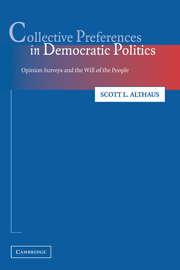1 - Introduction
Published online by Cambridge University Press: 06 January 2010
Summary
The more completely popular sovereignty prevails in a country, so much the more important is it that the organs of opinion should be adequate to its expression.
– James Bryce, The American CommonwealthThere are only three questions of any lasting importance to the study of what has since the 18th century been called public opinion. The entire corpus of human knowledge on the subject, from the philosophical inquiries of the ancient Greeks to the most modern statistical analyses, can be seen to unfold from just three enduring points of inquiry and contention: What is public opinion, or in what form ought the concept of public opinion be recognized? What is its nature, or what characteristics should public opinion possess? What kind of political power does it have, or what kind of power should it be given? Although a focus on the is became the hallmark of modern research on public opinion even as the work of previous generations emphasized the ought, the course of scholarship on public opinion continues to be set by these deceivingly profound and complex pole stars. It is a testimony to the knottiness of these questions that definitive answers to them seem as elusive today as they were to the contemporaries of Socrates and Protagoras.
This book is concerned with a particular definition of public opinion that has become generally accepted in recent years, a shortcoming in the nature of this public opinion that calls into question its usefulness in democratic politics, and the potential for this kind of public opinion to reflect the interests of the citizens it is taken to represent.
- Type
- Chapter
- Information
- Collective Preferences in Democratic PoliticsOpinion Surveys and the Will of the People, pp. 1 - 26Publisher: Cambridge University PressPrint publication year: 2003



